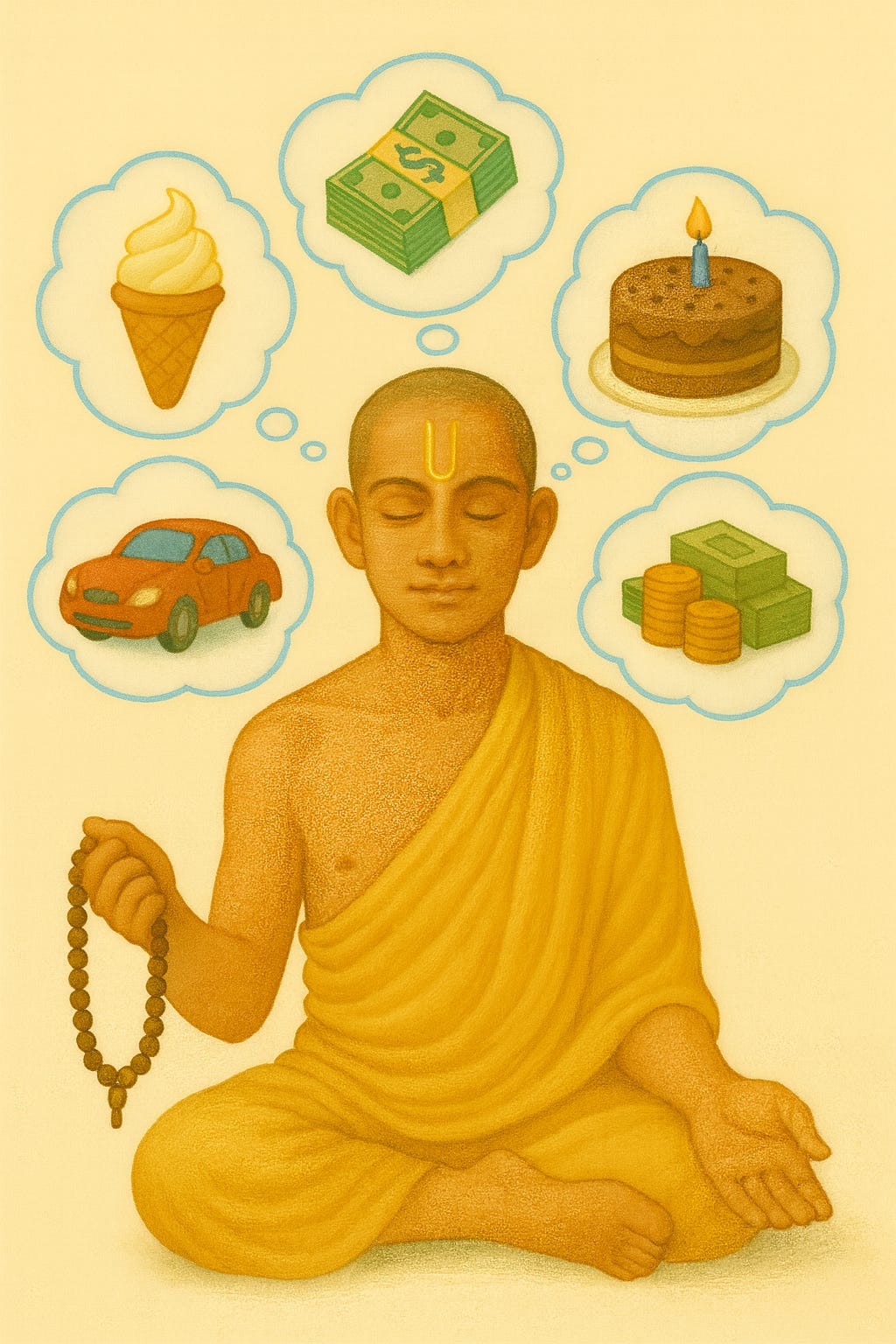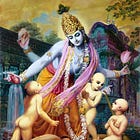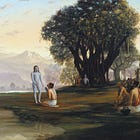From where my material desires come?
We usually think that all material desires come from the mind, but it is a little more complicated than that. Many other layers of our material self have a say. What we desire rarely comes from us.
Let's say I want to eat cookies or a bowl of ice cream. I think this is my desire; I'm the one who wants it. It comes from my own free will, right? Well, it's actually not so simple.
There is a treatment called fecal microbiota transplantation. This is a treatment created to help people with a serious imbalance in their gut flora. As we know, gut bacteria are essential for digestion and for the health of our body, and therefore imbalances in the population of gut bacteria can have serious consequences, like nausea, persistent abdominal pain, and diarrhea. In some cases, it can even be life-threatening. This treatment consists of introducing a new population of gut bacteria from a healthy donor, solving the problem. The way this transfer is done is not very pleasant, and you can guess by the name, but the point is that in most cases, it works.
In 2015, a healthy, athletic American lady from Rhode Island was suffering from serious intestinal problems and underwent this procedure. Before, she had a normal weight and was fond of practicing sports and eating healthy food. She was prescribed a fecal transplant because of a persistent infection from Clostridium difficile, a bacterium that was causing a serious imbalance in her gut. The problem was quickly solved after the treatment, but the woman started gaining weight quickly. During a period of three years, she gained 19 kilos and radically changed her lifestyle. Before, she used to be an athlete and was fond of healthy food, but now, despite the advice of the physicians, she is fond of cookies, chips, and fast food. She gradually stopped practicing exercise and became a typical couch potato. This case was well documented in a study published by the Oxford Academic. (10.1093/ofid/ofv004)
Further research showed that the donor (her daughter) had similar habits and was similarly overweight. Somehow, the fecal transplant made the woman acquire the dietary habits of her daughter! Outcomes like these are common in this procedure. In many cases, the patients would dramatically gain weight, and in others, dramatically lose weight after the bug bacteria transplant. The change in the gut bacteria would influence the foods they would desire, leading to changes in their diets and consequently gain or loss of weight.
This is actually something very well known. The composition of gut bacteria influences our dietary habits. The bugs living in our bowels produce different chemicals that affect the way the brain works. They have their say about what we should eat, and we frequently interpret their signals as "our desires". Similarly, fat cells can influence us to eat more. When we lose weight, the fat cells produce leptin, a substance that increases our appetite. Fat cells are also living beings, and when threatened, they tell us to eat more, and, again, their signal is frequently interpreted as "our desires".
This raises a series of questions about the nature of "our desires". Are our desires really ours, or are they just the result of the influence of gut bacteria, fat cells, or other sources?
According to the Vedas, our self is actually composed of different layers, and our consciousness is just the combination of the inputs of all these different layers. Sometimes we may have the idea that we have different voices fighting inside our heads, and this is actually not so far from reality.
The first level of our self is the gross body. That's what we can see when we look in the mirror. We usually say "we have a hand", or "we have a leg", or "I have a head". All the parts of our body are "ours", but our self goes well beyond the mere sum of the parts.
The body is composed of skin, muscle, bones, organs, etc. However, there is a part of the body that is more refined than the rest: The nervous system. The nervous system is based on the processing of different electrical signals and hormones. According to the Vedic description, the nervous system is the gross manifestation of the senses, which allows us to see, hear, feel, taste, smell, and thus experience the world.
The senses exist to satisfy the needs of the body. When the body is starving, we feel the urge to eat. If the food we eat is not sufficiently nutritious, there is an urge to eat something different. When the body lacks water, there is the impulse to drink. When there is the presence of an attractive member of the opposite sex, there is an impulse for sexual activity, reproduction, which is also a need of the body. There is a need for a soft place to sleep, a need for defense arrangements, and so on; all these are needs of the body, and the senses push us in different directions. In the Bhagavad-Gita, the urges of the senses are compared to horses pulling a chariot. It's very difficult to resist their urge.
The next level described in the Vedas is the mind. The mind is the repository of all our desires. We see and hear many things, and all of this is stored in the mind in the form of different desires that resurface periodically. We see someone eating something that looks delicious, and when we see it again sitting in the display of a restaurant, the desire resurfaces, and we desire to buy it. The mind is emotional by nature, like a small child, who wants many things and wants them now. The mind can be very forceful about what it desires. Sometimes people have too many desires and literally go crazy because of it.
The next component, according to the Vedas, is intelligence. Intelligence is our rational component. The intelligence has the mission of filtering the desires coming from the senses and the mind, making decisions about which ones are opportune or inopportune, and making plans about how to satisfy them. The senses may desire to eat something sweet to supply the caloric needs of the body, and the mind may process this desire further in the form of a pack of cookies, but if we are on a diet, the intelligence may check this desire and tell us that we should eat a salad instead.
Animals have senses and minds, but they don't have much intelligence; therefore, when they see something they desire, they immediately try to snatch it. Human beings have a more developed intelligence, and therefore, they can deliberate on it more thoroughly. If we see ice cream in the window of a shop, we don't try to break the glass to take it, but instead, we enter the shop, ask the attendant, pay for it, and so on. The presence of an evolved intelligence is what makes us human.
The next component is the ego: our concept of identity. The ego is responsible for our self-image, which we fight to protect. If someone offends us, for example, we become angry and we want to protest or to retaliate. This all happens under the influence of the ego.
In the allegory of King Purañjana in the Srimad Bhagavatam, our body is compared with a huge city, where we reside as the king. The senses, mind, intelligence, and ego are different ministers of the king, who try to influence him in different ways, and the ministers themselves are subjected to the influence of the different subjects, who also try to influence them in different ways. Every cell of our body, as well as other living beings living inside our body, like our gut bacteria, is a distinct living entity that does everything at its disposal to satisfy its needs. Similarly, all the different desires stored in the mind compete for satisfaction, and the ego and intelligence place their own demands.
As the king, we have the autonomy to make our decisions, but we are directly and indirectly influenced by all these different layers of our self. As long as we are living under a material conception of life, it's practically impossible to resist these different forces, and thus we end up struggling to satisfy all these different desires of our ministers and subjects.
The Vedas, however, speak about something that is beyond the body. This is the soul, the spiritual particle of consciousness that permeates the whole body. The soul is the part of the self that goes from one body to another, followed by the mind, intelligence, and ego. Actually, according to the Vedas, there are actually two egos: The true ego and the false ego. The false ego (or ahaṅkāra) is connected with the material world and leads to the acceptance of one body after another in the cycle of saṁsāra, while the true ego is connected with the real identity of the soul as an inhabitant of the spiritual reality.
When we understand our real position as a soul, independent of the body, we start to connect with our true ego or his real identity beyond the body. This leads to a great expansion of our consciousness, both in terms of knowledge and awareness. In this stage, our concept of reality becomes much more vast, and we can see much beyond what normal people can see. This is a path that leads to a blissful existence in the spiritual sky.
If you read this article to the end, give it a like or write a commentary. This makes Substack recommend it to more people.
Read also:






Hari bol~ thanks so much for this article. It calls for daily reflection on what we think and desire.
Hare Krishna Prabhu ji 🙏 informative article with a practical explanation. Thank you prabhu ji